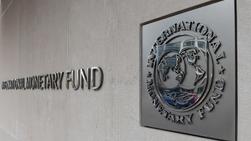 An exterior view of the building of the International Monetary Fund (IMF), with the IMG logo, is seen on March 27, 2020 in Washington, DC. (OLIVIER DOULIERY / AFP)
An exterior view of the building of the International Monetary Fund (IMF), with the IMG logo, is seen on March 27, 2020 in Washington, DC. (OLIVIER DOULIERY / AFP)
WASHINGTON - The Regional Comprehensive Economic Partnership signals that there is an appetite for further integration within Asia, despite setback for globalization in recent years, an International Monetary Fund official has said.
Asia's debt now accounts for nearly 40 percent of the global total, compared with 25 percent in 2007, according to IMF estimation
"In the last few years there has been a trend towards de-globalization. But what the RCEP signing tells you is that there is an appetite for integration within Asia," Krishna Srinivasan, deputy director of IMF's Asia and Pacific department, told Xinhua in a recent virtual interview.
"It has a potential to promote trade, investment and growth," Srinivasan said.
ALSO READ: IMF warns of 'stagflationary' risks in Asia, cuts growth figures
"Its successful implementation would also help economic integration in region," including through a strengthening of regional supply chains," he said.
At the same time, the IMF official noted that "it remains very important for all countries to continue their efforts to seek multilateral solutions on trade, including through WTO reforms."
Srinivasan said the Russia-Ukraine conflict could exacerbate fragmentation of supply chains, which could cause vulnerabilities for countries in Asia, a key hub for global supply chains. "Asia is one region which relies a lot on global supply chains, and this war can actually disrupt these and is a source of serious concern."
Noting that Asia could be affected "quite significantly" if there is fragmentation in the world economy, the IMF official said the multilateral organization hopes that "as the pandemic is behind us, and as the war comes to an end, that efforts will be made to not undercut the integration we've had over the past years."
According to the IMF's latest forecast, Asian GDP is expected to grow by 4.9 percent in 2022, 0.5 percentage point less than projected in January, and slower than last year's growth rate of 6.5 percent.
Srinivasan said the conflict impacted Asia's growth in three ways: it pushed up commodity prices, causing significant rise in inflation in many countries; it hurt growth in Europe, leading to collapse in external demand for Asia; it exacerbated the tightening of global financial conditions, which hit Asian countries, especially those with weak fundamentals and high debt levels.
The IMF official also noted that inflation was already rising in many parts of the world, including the United States and other advanced and emerging market economies, even before the conflict. And the war has further fueled inflation, strengthening the case for a further tightening of monetary policy.
ALSO READ: IMF chief: China has ample policy space to boost economy
"In this context, while a tightening of monetary policy in the US and other advanced economies is widely expected, any surprises in terms of more-than-expected increases in interest rates could lead to a significant tightening of financial conditions for countries in Asia and could be disruptive," Srinivasan said.
For China, the IMF revised down 2022 growth forecast to 4.4 percent compared to 4.8 percent in January
"And don't forget that many countries in Asia have elevated levels of debt, both public and private. So these countries will be affected as debt servicing costs rise as interest rates increase," he said.
Srinivasan noted that there is a combination of rising inflation and a slowing of economic activity in several countries in the the region, leading to rising risks of stagflation.
Under the current circumstances, the IMF official warned that there's a "tradeoff" between providing support to the vulnerable and having medium term fiscal consolidation, as debt has been rising.
Asia's debt now accounts for nearly 40 percent of the global total, compared with 25 percent in 2007, according to IMF estimation.
Noting that challenges are not the same across all countries, Srinivasan urged policymakers to "calibrate" their fiscal and monetary policies "depending upon the impact on activity and inflation."
ALSO READ: IMF cuts global growth forecast to 3.6% amid Ukraine conflict
For China, the IMF revised down 2022 growth forecast to 4.4 percent compared to 4.8 percent in January. The revision reflects a sizable negative impact from the conflict in Ukraine and localized COVID-19 outbreaks and related lockdowns. These negative effects are partly offset by the positive impact of policy stimulus, according to the IMF.
"We are of the view that greater emphasis should be placed on fiscal policy," Srinivasan said. "We would like fiscal policy to provide support to households and poor, so that you boost consumption."
Such fiscal policy would also promote China's balanced recovery, reduce carbon emissions and help meet its climate goals, he added.


